
Understanding Hypertension: The Silent Killer
High blood pressure, commonly known as hypertension, is a medical condition that affects millions of people worldwide. Often called the “silent killer” because it often shows no symptoms until significant damage has occurred, hypertension is a major risk factor for heart disease, stroke, and other serious health problems. Understanding this condition, its causes, symptoms, and management strategies is important to maintaining a healthy life.
What Is Hypertension ?
High blood pressure occurs when the force of blood against the walls of the arteries is consistently too high. Blood pressure is measured in millimeters of mercury (mm Hg) and recorded with two numbers: systolic pressure (the first number, representing the pressure in your arteries when your heart beats) and diastolic pressure (the second number, representing the pressure in your arteries when your heart rests between beats). Normal blood pressure is usually around 120/80 mm Hg. Hypertension is diagnosed when blood pressure readings are consistently 130/80 mmHg or higher.
Causes Of High Blood Pressure
- Genetics: Family history can play a significant role.
- Age: The risk of high blood pressure increases with age.
- Lifestyle choices: Poor diet, lack of physical activity, and excessive alcohol consumption.
- Obesity: Excess weight can increase pressure on the heart and arteries.
- Stress: Chronic stress can contribute to high blood pressure.
- Medical conditions: Conditions such as diabetes and kidney disease can increase the risk.
Symptoms Of High Blood Pressure
The most challenging aspect of high blood pressure is its lack of obvious symptoms. Many people with high blood pressure are unaware that they have it. However, in some cases, individuals may experience:
Headache Shortness of breath Nosebleeds Face flushing Dizziness
These symptoms are not specific to high blood pressure and usually do not occur until blood pressure reaches a severe or life-threatening stage.
Risk Associated With High Blood Pressure
If left untreated, high blood pressure can cause:
- Heart attack: High blood pressure can cause arteries to become stiff and thick (atherosclerosis), which can lead to a heart attack.
- Stroke: High blood pressure can cause blood vessels in the brain to burst or clog more easily.
- Heart attack: The heart has to work harder to pump blood, which can cause the heart to become enlarged.
- Kidney damage: High blood pressure can damage the arteries around the kidneys, reducing their ability to work properly.
- Vision loss: High blood pressure can put pressure on or damage blood vessels in the eyes.
Managing High Blood Pressure
Managing and preventing high blood pressure involves lifestyle changes and, in some cases, medications. Here are the key strategies:
- Healthy diet: Focus on a diet rich in fruits, vegetables, whole grains, and low-fat dairy products. The DASH (Dietary Approaches to Stop Hypertension) diet is often recommended.
- Regular exercise: Aim for at least 150 minutes of moderate-intensity aerobic activity or 75 minutes of vigorous activity each week.
- Weight management: Maintaining a healthy weight can significantly reduce the risk of high blood pressure.
- Limiting alcohol consumption and avoiding tobacco: Reduce alcohol consumption and avoid smoking to lower blood pressure.
- Stress management: Techniques such as mindfulness, meditation, and deep breathing exercises can help manage stress levels.
- Medication: In some cases, doctors prescribe medications such as diuretics, ACE inhibitors, or beta-blockers to help control blood pressure.
Medications
If lifestyle changes are insufficient to control high blood pressure, your doctor may prescribe medication. The choice of medication depends on a variety of factors, including your blood pressure levels, age, ethnicity, and other medical conditions. Common classes of antihypertensive medications include:
Diuretics
Diuretics, also known as “water pills,” help your kidneys remove excess sodium and water from your body, thereby reducing blood volume and, as a result, lowering blood pressure. Examples include hydrochlorothiazide, chlorthalidone, and furosemide.
ACE Inhibitors
Angiotensin-converting enzyme (ACE) inhibitors help relax blood vessels by blocking the formation of a hormone that narrows blood vessels. Examples include lisinopril, enalapril, and ramipril.
Angiotensin II Receptor Blockers {ARBs}
ARBs block the action of the hormone angiotensin II, which constricts blood vessels. Examples include losartan, valsartan, and irbesartan.
Calcium Channel Blockers
These medications prevent calcium from entering your heart cells and blood vessel walls, resulting in lower blood pressure. Examples include amlodipine, diltiazem, and verapamil.
Beta Blockers
Beta-blockers reduce the workload on your heart and open up your blood vessels, allowing your heart to beat slower and with less force. Examples include metoprolol, atenolol, and procarbazine.
Conclusion
Hypertension is a manageable condition with the right combination of lifestyle changes and medications. By adopting a healthy diet, engaging in regular physical activity, maintaining a healthy weight, limiting alcohol, quitting smoking, and effectively managing stress, you can significantly reduce your blood pressure. For those who need additional support, medications are available to help achieve optimal blood pressure control. Regular monitoring and follow-up with your healthcare provider are essential to ensure the effectiveness of your treatment plan.
Taking proactive steps to manage your blood pressure can prevent serious health complications and improve your overall quality of life. Stay informed, adhere to your treatment plan, and make the necessary lifestyle changes to keep your blood pressure in check.
Remember, regular check-ups with your healthcare provider are essential in detecting and managing hypertension effectively. Stay informed, stay healthy, and take control of your blood pressure today.